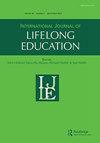瑞典研究圈遇到肯尼亚chamas:非正式成人教育传统全球互动的案例研究
IF 1.9
Q2 EDUCATION & EDUCATIONAL RESEARCH
引用次数: 0
摘要
摘要本文采用瑞典非政府组织倡导的研究圈模式,对肯尼亚西部的一个社区自助团体(chama)进行了实证研究。从方法上讲,这是一项定性研究,使用半结构化访谈和参与者观察来收集数据。结果表明,学习圈的想法是通过当地预先存在的学习社会基础设施转移和转化的,即一个基于肯尼亚广泛的查马传统组织起来的农业集体。当chama接受学习圈并将其融入当地时,他们主要坚持以前的会议和活动形式。将该活动称为研究圈的附加值是,它扩大了该组织的网络,并增加了邀请专家进行咨询的机会。此外,与其他(非研究圈)chama相比,该组的地位有所提高。本文章由计算机程序翻译,如有差异,请以英文原文为准。
Swedish study circles encounter Kenyan chamas: a case study on the global interaction of traditions in non-formal adult education
ABSTRACT This article reports an empirical case study of a community self-help group (chama) in Western Kenya, utilising the study circle model promoted by a Swedish non-governmental organisation. Methodologically, it is a qualitative study using semi-structured interviews and participant observation for data collection. The results show that the study circle idea was transferred and translated through a locally pre-existing social infrastructure for learning, i.e. a farming collective organised and based on the widespread Kenyan tradition of chama. When the chama embraced the study circle and made local sense of it, they did so by mainly sticking to the same form of meetings and activities they previously had. The added value of referring to the activity as a study circle was that it expanded the group’s networks and increased its chances to invite specialists for consultation. Also, some increase in status for the group compared to other (non – study circle) chamas was noted.
求助全文
通过发布文献求助,成功后即可免费获取论文全文。
去求助
来源期刊

International Journal of Lifelong Education
EDUCATION & EDUCATIONAL RESEARCH-
CiteScore
3.10
自引率
27.80%
发文量
40
期刊介绍:
The International Journal of Lifelong Education provides a forum for debate on the principles and practice of lifelong, adult, continuing, recurrent and initial education and learning, whether in formal, institutional or informal settings. Common themes include social purpose in lifelong education, and sociological, policy and political studies of lifelong education. The journal recognises that research into lifelong learning needs to focus on the relationships between schooling, later learning, active citizenship and personal fulfilment, as well as the relationship between schooling, employability and economic development.
 求助内容:
求助内容: 应助结果提醒方式:
应助结果提醒方式:


